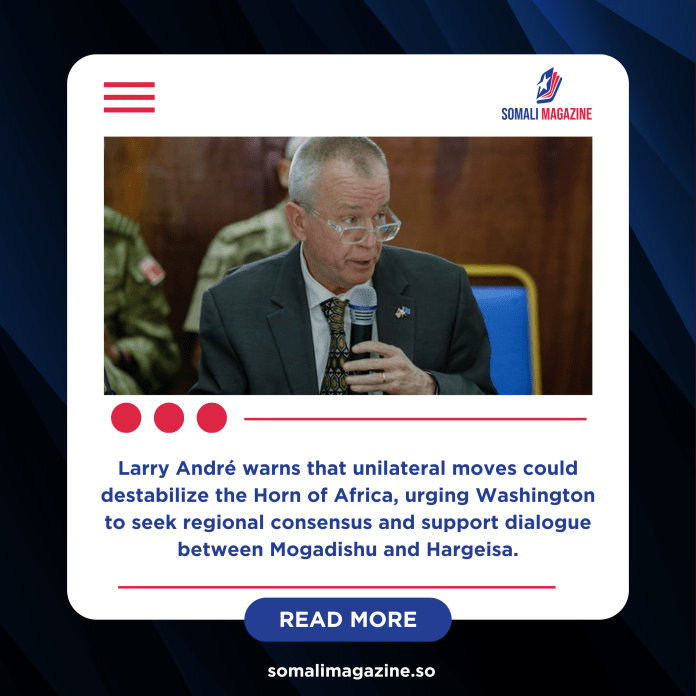Facebook Twitter (X) Instagram Somali Magazine - People's Magazine
Former U.S. Ambassador to Somalia, Larry André, has urged Washington to move cautiously on the sensitive question of recognizing Somaliland, warning that any unilateral action could destabilize the Horn of Africa and weaken America’s relationships in the region.
According to André, the Horn of Africa is already weighed down by multiple conflicts — both internal and across borders. He explained that sudden moves to recognize Somaliland could disrupt fragile balances, stir clan-based tensions, and complicate efforts to bring peace to Somalia. Instead of acting alone, André believes the U.S. should consult with key regional players — Ethiopia, Kenya, Djibouti, and Uganda — as well as the African Union, before deciding on Somaliland’s political status.
Two Possible U.S. Paths
The former envoy outlined two potential approaches the United States could consider.
-
Maintain the Status Quo: Continue operating with the embassy in Mogadishu, keeping all diplomatic relations based on Somalia’s current federal system.
-
Open a Diplomatic Office in Hargeisa: Establish an official U.S. presence in Somaliland’s capital, Hargeisa, while still maintaining the main embassy in Mogadishu.
Of the two, André favored the second option. He described it as a “middle ground” that would give Washington the chance to engage with Somaliland in a practical way while still respecting Somalia’s federal unity. He argued that this move could also encourage dialogue between Mogadishu and Hargeisa, helping both sides find a peaceful and negotiated way forward.
Stability vs. Recognition
André acknowledged that Somaliland is more stable than much of Somalia, with relatively strong governance and security structures. However, he stressed that Somaliland’s stability cannot replace the need for a lasting political settlement. Recognizing Somaliland without broader consensus, he warned, risks alienating many Somalis who still support a united country.
He pointed to Puntland, another semi-autonomous region in Somalia, as an example of how progress and stability can be achieved within the federal system. Puntland has managed to strengthen its institutions and maintain security while remaining part of Somalia. According to André, this shows that development and governance do not always require independence.
The Bigger Picture: Somalia’s Challenges
For Somalia’s future, André emphasized two urgent tasks:
-
Reconciling with Somaliland: Finding a durable political agreement that addresses Somaliland’s aspirations while keeping the wider Somali nation stable.
-
Defeating al-Shabab: The militant group continues to control territory, threaten security, and block national progress. André argued that any political settlement with Somaliland must also align with efforts to eliminate this insurgent threat.
He underlined that ignoring either issue would leave Somalia vulnerable and unable to move toward long-term peace and prosperity.
Talks Have Stalled
Over the years, Mogadishu and Hargeisa have held several rounds of talks, with mediation efforts led at different times by Turkey and Djibouti. Despite these initiatives, little progress has been made on the fundamental question: should Somaliland remain part of Somalia under a federal arrangement, or should it pursue internationally recognized independence?
André’s remarks suggest that the U.S. should position itself as a supportive mediator rather than taking sides. By engaging both Hargeisa and Mogadishu, and consulting regional and continental partners, Washington could help lay the groundwork for meaningful negotiations instead of heightening divisions.
A Call for Patience and Diplomacy
In conclusion, the former ambassador advised patience, caution, and diplomacy. Somaliland’s stability and governance successes deserve recognition, he said, but not at the expense of Somalia’s unity and the Horn of Africa’s fragile peace. The United States, in his view, should encourage dialogue and avoid unilateral moves that could backfire.
“Somalia’s success,” André suggested, “will depend on reconciling with Somaliland and defeating al-Shabab. Only then can the country and the wider region build a stable future.”

